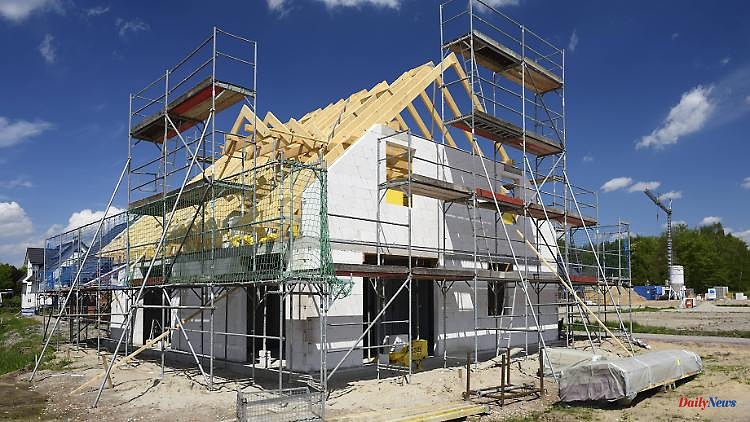Building rates are rising. Inflation keeps breaking new records. Firstly, building materials and skilled workers are in short supply and secondly expensive. Nevertheless, property developers should adhere to the guaranteed fixed prices. Can this go well? And if not, what does it mean for customers?
Developer contracts are a double-edged sword. It is true that customers largely have to "buy their property off the shelf". In return, they benefit from service from a single source - and the guaranteed fixed price of their contractual partner. In normal times, this is an undeniable advantage. At least if you have chosen a healthy and reputable property developer.
Unfortunately, things have not been normal for a long time. The pandemic, the Ukraine war and the associated supply chain disruptions are making life increasingly difficult for property developers. Loans are now becoming more expensive. This increases the pressure on companies.
One or the other property developer will therefore have to make additional demands on its customers. A difficult situation for everyone involved, especially when said customer has to ask his bank for a second look. Subsequent financing is not welcomed by the financial institutions. If you still get it, you have to dig really deep into your pocket. This is all the more true as most customers who are currently affected still have their financing completed at an interest rate of less than one percent. Because in the case of supplementary financing, the banks not only have to grant the missing amount as a loan, but also put the entire construction financing on a new footing. The reason is the customer's now reduced equity share or the higher loan-to-value ratio without a simultaneous increase in the property value.
For example, if you no longer have to finance just 80 but 90 percent of the purchase price because you are applying for additional financing of 50,000 euros, you now have to expect an interest rate of 5 percent and more. This high value is justified, among other things, by the fact that the higher loan-to-value ratio for the entire loan has to be compensated for.
In such a constellation, customers who have agreed the possibility of a repayment change with their bank can consider themselves lucky. The FMH has long pointed out that this option is more important than the right to regular special repayments. In the FMH building loan comparisons, interested parties can make their selection based on these specifications.
If, for example, the loan agreement originally provided for a repayment of three percent of the loan amount per year, customers can reduce the quota by one percentage point or more. This creates additional leeway for additional financing and for the banker, who must above all keep an eye on the risks of the new loan.
For example, let's say a customer took out a $400,000 loan in November 2021. The interest rate is fixed for 15 years, the repayment is three percent. With a good provider you had to pay 1.22 percent interest. This corresponds to a monthly rate of 1400 euros for interest and repayment.
If this customer now repays only 2 percent instead of 3, he reduces his monthly burden by 333 euros. He could invest this money in expensive follow-up financing.
However, anyone who currently has a problem with refinancing can also turn to installment loan providers who also offer higher amounts of money with terms of ten years. They are also expensive: 50,000 euros with a term of ten years currently cost between 4 and 5 percent interest - and thus around 425 euros per month. Nevertheless, the step can be worthwhile, since loans secured by the land register are linked to loan-to-value limits (see above) and often even cost more than cheap installment loans.
With a long installment loan term, the monthly installment can also be reduced almost to the amount of the savings through a repayment change. And these can then do without an object value check et cetera. The only important thing is that the additional loan must be repaid in full within the term.
As a third alternative, prospective builders can try to agree on a kind of interim solution with their bank: Sometimes it is possible to agree on a loan agreement for an increased loan application - and to state in a note that you do not have to take up to 20,000 euros if the amount is not is needed. That also creates some flexibility. Last but not least, there is the option of offering a debt-free property in the family as security for the follow-up financing.
It is important to be wide awake when the first problems appear with the property developer. Because as a general rule, if a property developer cannot cope with the fixed-price contract, collecting new funds is often just the last, desperate attempt to prevent insolvency. It is therefore very important that you do not pay more than what is required in return according to the contract.
If he fails, the customer has a problem. Not only because he has once again given money to a company that is threatened with liquidation, but also because he may be confronted with a new contractual partner. It is basically gratifying when another company takes over the completion of the construction project. However, it can then be expected that neither the old price nor the originally planned move-in date can be maintained.
All customers who have not yet signed a property development contract but intend to do so should also keep this risk in mind. Because many property developer offers are now provided with a so-called price escalation clause. After that, the developer may increase the fixed price if material prices rise. Such formulations are a knockout at most banks. -Criteria for a loan approval.
In some cases, property developers even go over to building the houses themselves and then sell the finished property with a profit. This model is likely to become even more widespread in the future.
All in all, the sad certainty remains that buying a property has not necessarily become less risky - or easier - in recent months and years.
Max Herbst is the owner of FMH Finanzberatung, which has been providing independent interest rate information since 1986.
(This article was first published on Wednesday, May 25, 2022.)












